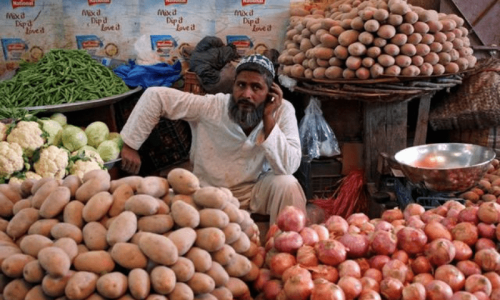KARACHI: If there is one thing that stands out in the outgoing government’s seemingly bad report card, it is the massive increase in prices of almost everything that’s sold on the market and outside it.
Analysts agree that the 16 months of the coalition government’s rule have left an unbearable burden on consumers on the back of whopping price hikes in food items, transport charges and power and gas utility bills.
There have been many factors behind this unrelenting inflation, including higher global commodity prices and the rupee’s free fall against the dollar that further escalated the cost of imported goods. Besides, the government caved into almost all demands of the International Monetary Fund to secure loan instalments, adding to the miseries of citizens.
Meanwhile, goods manufacturers in the private sector have enjoyed a free hand to keep raising prices at whim.
Cost of living doubles for most citizens as price of almost every item sees massive jump
Wheat flour rates hit record highs despite a good wheat harvest of 27.63 million tonnes and imports of 2.73m tonnes during the previous fiscal year, costing over one billion dollars.
Flour millers kept pushing up the flour rates, citing delays in the release of wheat by provincial governments, dependence on costly wheat from the open market, almost a 100pc rise in procurement price offered to wheat growers, and the smuggling of wheat to Iran and Afghanistan.
The rest of the damage was done by the influx of investors, hoarders and speculators in the wheat and sugar sectors, on which no serious progress was made to recover the piled-up stocks.
Another notable jump came in ghee and cooking oil prices despite an 8.5pc jump in imports of palm oil to 3m tonnes during 2022-23.
The most shocking jump was witnessed in power bills due to a rising tariff of Rs7.5 per unit and a further jump in various upward adjustments in different charges.
A massive hike in petrol and diesel rates by over Rs100 per litre also burdened already hard-pressed consumers, who are still waiting for the much-touted positive impact of the import of 100,000 tonnes of Russian crude.
Gas charges up to 3.3719 per million British thermal units have risen to Rs295 from Rs141.57.
Mohammad Sohail, CEO of Topline Securities, said average inflation over the past 16 months has been 27pc, resulting in an equivalent increase in the average cost of living.
Significant rupee devaluation and higher international commodity prices were the main reasons for the rise in food prices, as the country imports most food items or they are linked with the dollar parity, he said. Besides, higher local fuel prices, again linked to international prices, also stoked food inflation.
However, Mr Sohail added that these factors were not within the government’s control, making it unable to control prices and gain the support of the masses.
He was confident that securing the IMF deal along with other inflows would ease pressure on the economy in the short term. However, to ensure the long-term stability of the economy, “we must make difficult decisions to steer it back on track”.
“With that being said, it’s unlikely that consumers will experience significant immediate relief. Some relief in the form of less increase in inflation can be seen,” he said, adding that gas tariff has gone up by 30-40pc.
“We believe consumers will remain under pressure in the caretaker government set-up but will get some relief since we see average inflation to come to 21pc in FY24 from 29pc in FY23,” he added.
Mr Sohail expected the cost of doing business, impacted by the rupee-dollar parity and interest rates, to start normalising in the second half (January-July) of this fiscal year.
He also expected the automotive and consumer appliance sectors to “continue to experience slowness”, primarily due to the impact of elevated inflation and higher policy rates.
Rauf Ibrahim, the chairman of the Karachi Wholesale Grocers Association (KWGA), noted that the cost of living had almost doubled because of massive hikes in prices of food items, utilities and transport.
Another key factor behind the rising living costs for most parents was higher education expenses due to rising prices of books, notebooks, school and college fees, and school and public transport.
He regretted that a lack of government oversight had led to the hoarding of wheat, sugar and rice and speculation on their prices.
One example of the government’s lack of writ was that it couldn’t implement the closing of shops by 8pm and marriage halls by 10pm, Mr Rauf said.
He said the Rs30 billion subsidy to provide essential items at subsidised rates at over 500 utility stores in the country had remained a flop idea as these stores were operating in upper-middle-income or posh areas. “Only 20pc of poor people are benefiting from these stores,” he said.
Mr Rauf hoped that the new interim government set-up might take stock of the situation and devise policies to pull the country and consumers out of these financial troubles.
Due to a calculation error, the chart published earlier with this story misrepresented the percentage increase in the prices of various goods mentioned. The chart has since been updated.
Published in Dawn, August 9th, 2023














































Dear visitor, the comments section is undergoing an overhaul and will return soon.